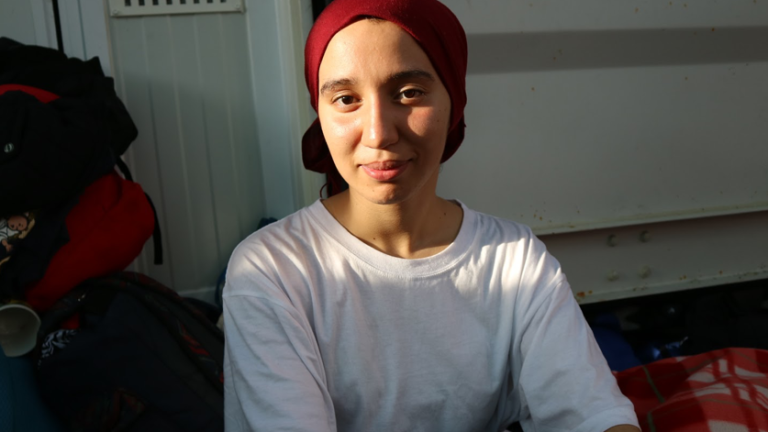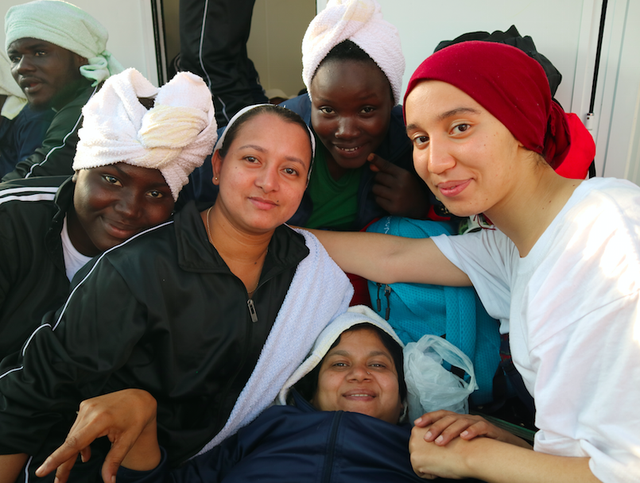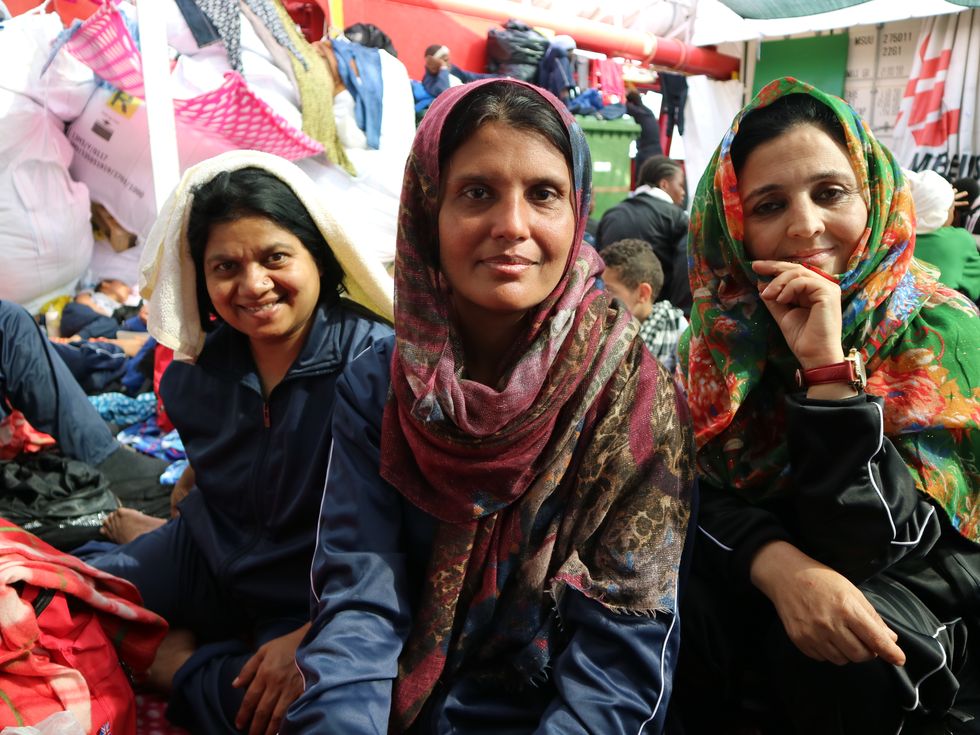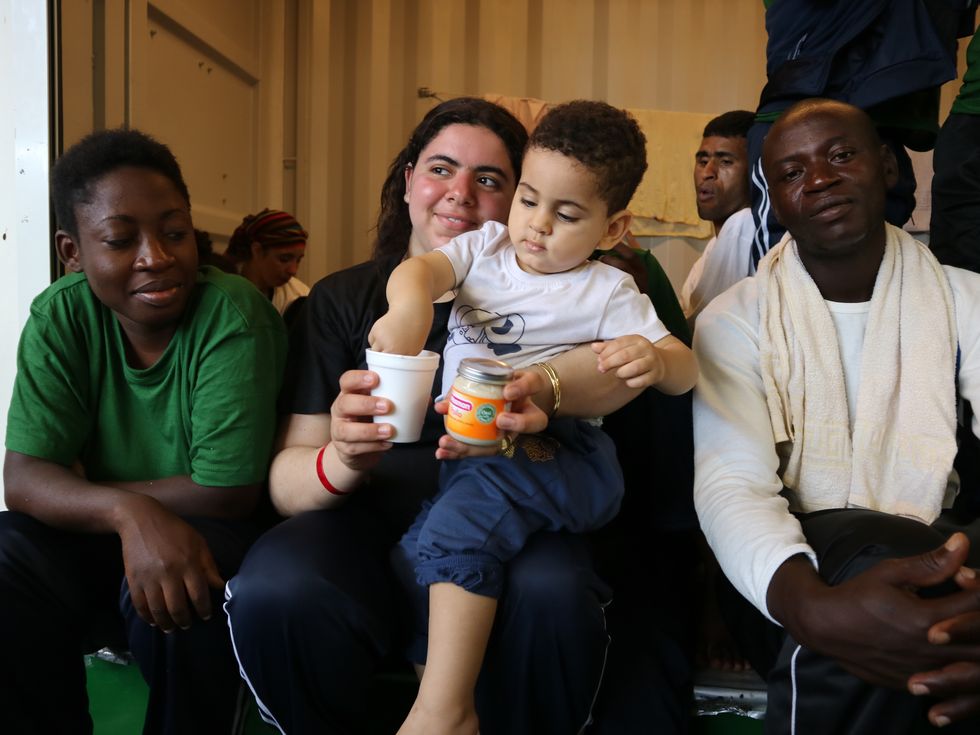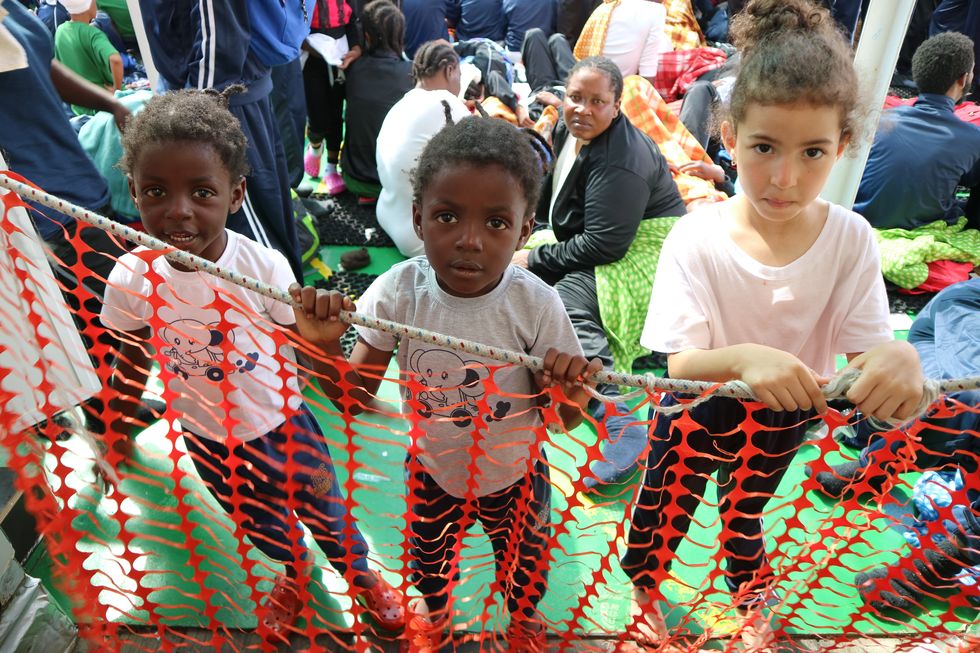Sanae El-Houari wasn't sure how she'd got here. Aged just 18 years-old, she wished she could be like other normal people her age – spending time with her friends, worrying over her school exams, wondering what it was she wanted to do with her life.
Instead, she was sat on a boat, surrounded by more than 1000 people, on her way to Italy. All she could think of was how she missed her mother, who she hadn't seen or spoken to in months. How, she wondered, was she going to tell her that she had just been rescued from a near-sinking boat in the Mediterranean sea?
Every day, hundreds of women and children, like Sanae, board boats in Libya, in search of a better, safer life in Europe. Many women flee countries in West Africa – Guinea, Nigeria, and Côte d'Ivoire are the most common – but also countries further afield, including Syria, Bangladesh and Iraq. Sometimes the women travel alone, sometimes they're with friends. Some are pregnant, others travel with their children.
In Sanae's case, she and her mother had always been close. In their small home on the outskirts of Beni Mellal, a city in Morocco, the pair bonded over cooking, books and music. They would often sit at the kitchen table and talk for hours.
When Sanae was 15, her father abandoned her mother to start a new family. He took the family finances and left them with nothing, and Sanae and her mother were penniless. Her mother worked overtime to keep the lights on in their home, and to make sure there was always food on the table.
Later, Sanae's mother fell ill. She had heart problems and was unable to work. Sanae realised she had to step in and earn some money to support them both. Knowing she couldn't work full-time and study, she reluctantly left school at the age of 18 to find a job.
A few months ago, a stranger knocked on their door. The woman was looking for people to work as cleaners for homes in Libya, and she offered Sanae a job on the spot.
Sanae was told she'd earn a lot more than she would in Morocco, and so she decided she would go to Libya and work, and send back money to her mother.
In the weeks leading up to departing for Libya, her mother cried every day. 'She wished I didn't have to go,' Sanae said.
Sanae arrived in Libya around two months ago. The woman who had persuaded her to take the job took her to a home in a city in the north, near the sea. The home, it turned out, was her husband's home. When Sanae walked in, she saw there were six other girls working in the home. The women were all older than Sanae by 3-5 years – one woman was also from Morocco, two were from Algeria, two were from Bangladesh, and one was from Tunis.
Sanae soon realised she'd been tricked: she was not there to clean homes, and these women were not there of their own volition. She was there to work as a slave. The man forced Sanae and the other women to clean, cook, and do house chores from 6am until late at night.
He would regularly beat, verbally harass, and sexually assault them. Often, he would not feed them for days.
So as to not arouse suspicion with Sanae's mother, the man sent her a small sum of money every so often, but never allowed Sanae to call her. The women were forced to live in a space next door to the man's family home. He was easily agitated, and when he sat and ate with his family, he would often throw the table across the room.
His wife – the woman who had tricked Sanae to come to Libya – watched on as he hurt the captive women. 'She could see he hit us, she could see it on our faces. But she didn't say anything,' Sanae said.
One night in late May, the man tried to rape Sanae.
'He asked if I was still a virgin. I said yes, and then he tried to rape me. But I punched him across the face, on his right cheek, and managed to stop it. When I hit him, he was angry - he told me 'you're the first to do that, and you're the last one.''
Sanae said he then beat her every day as punishment. When the other captive women saw that he'd tried to rape Sanae, they conspired together to help her escape. Sanae said although the women had escaped 'death and pain' in their home countries, they wanted to help her be free. 'I was the lucky one,' she said.
In the middle of the night, as the man slept, she opened the window from the two-storey building and leapt out. After a month captive, she was free.
She ran to the coast, where she slept on the top of a car for several weeks. Every day, as she looked up to the sea, she saw men send hundreds of people off on rubber and wooden boats. She wondered: where were they going, and can I join them?
She approached one of the people who had been sending the boats off. He was a smuggler who had been sending people towards Europe. She didn't have money to pay the smugglers, and wept at the prospect of being stuck in Libya.
But out of sympathy, one smuggler put her on one of the boats. 'I thought, "I will go to Italy," she said, "and I will face the sea.'''
On the 16th of June, Medecins Sans Frontieres (MSF) rescued Sanae and the others onboard her boat. They found her just in time.
'We were on the boat with little boys and girls, and they were crying.'
Sanae sat on the MSF rescue boat wrapped in a blanket. 'If they [MSF] were late by 5 or 6 minutes, I swore the boat would have sunk – it was tipping. I would have drowned.'
Today, there are more displaced people than after Second World War, a record high. Yet despite the overwhelming scale of the crisis, refugee and migrant women's voices – and the gender-specific hardships they face – have been left unheard and overlooked, according to charities and experts.
Women are fleeing for many reasons: persecution, sexual violence, poverty, war. Often, they're trafficked to Europe, or subjected to sexual violence on route to Libya, where more than 70,000 refugees and migrants have travelled through in 2017 so far.
The threat of trafficking, rape and assault in migration are all issues more likely to harm women. But Sanae's route – one that moves across the Mediterranean sea and towards Europe, after travelling through Libya – was recently described as the 'world's deadliest and most dangerous for children and women' by UNICEF. In its report, it said the route is mostly controlled by 'smugglers, traffickers and other people seeking to prey upon desperate children and women.'
Beyond violence on the migration route, a lack of rights in their home country is increasingly a reason that's driving them to leave in the first place. Women on the MSF boat – from countries including Nigeria, Ivory Coast, and Morocco – all spoke of fleeing abusive partners, a lack of financial freedom from men, and sexual assault as reasons why they left their country of origin.
'You live, but you don't live at all,' another Moroccan woman said, as she sat on the floor with Sanae. Just a few weeks earlier, she had run away from an arranged marriage on her wedding night in fear of her life.
'You're alive, but you're not really alive. We can't let men have our lives in their hands.'
Sanae hopes to one day go to university to study history, but she knows she needs to find some work to send money back to her mother in the meantime.
'Maybe I will find a job, maybe I will finish school, maybe both,' she said the day before she departed the boat in Reggio Calabria, the south of Italy. 'I hope it will get better from here. I'm only 18, I need more time.'
Rossalyn Warren is a freelance journalist and a contributer to The Fuller Project for International Reporting
